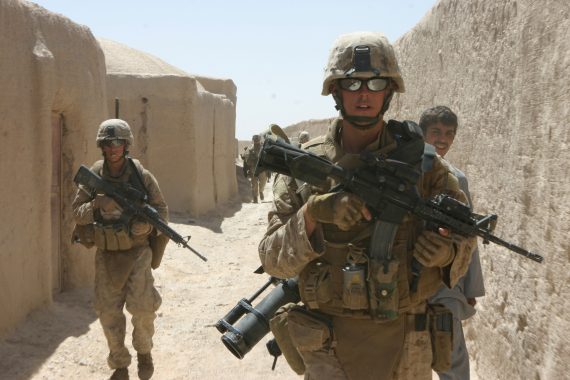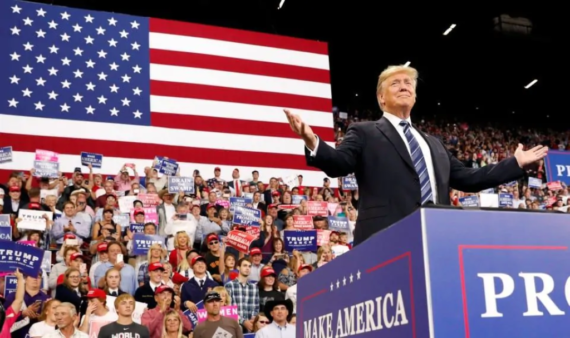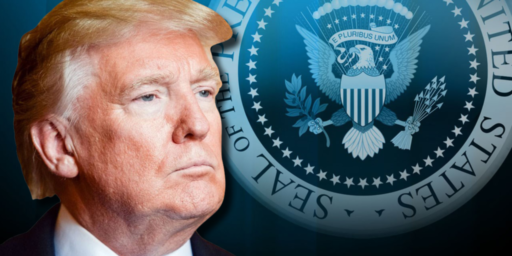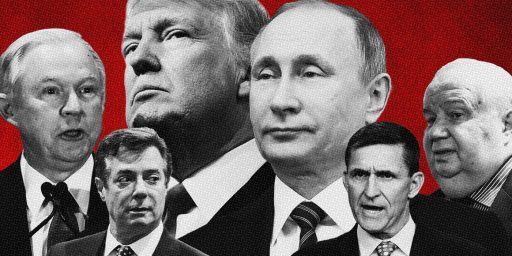A Presidental Pardon — and the Case for Another
This week President Trump pardoned Army lieutenant Michael Behenna, who was convicted in 2009 by a general court-martial of murdering an Iraqi detainee in 2008. Behenna was questioning the detainee in the desert when he claims the detainee attacked him, requiring him to shoot the detainee in self-defense. A panel (jury) did not believe Behenna’s claims of self-defense and sentenced him to 25 years confinement. He served 5 years confinement and was released on parole in 2014, prior to this week’s full pardon.
The President responded to domestic political pressure, in particular the advocacy of the almost-inappropriately named Oklahoma Attorney General Mike Hunter.
The pardon, of course, is squarely within the President’s power, for any reason, or no reason at all, and his decisions are completely unreviewable by any court or legislature. The White House press statement on the pardon observed an appellate court had “noted concern about how the trial court had handled Mr. Behenna’s claim of self-defense” — ignoring that the appeals court upheld his conviction nonetheless, finding the military judge’s self-defense instruction error to be harmless. It is also important to note traditionally, the pardon power has been used to correct a manifest injustice, and in this case, reversed a jury verdict where there was no appellate error present. The pardon apparently was politically driven — nothing in the White House statement speaks to legal justification or a miscarriage of justice at all.

U.S. Army Special Forces Major Matt Golestyn’s case, however, is fundamentally different. President Trump’s December 16 Tweet promising to review the pending general court-martial case of Matt Golestyn immediately attracted the attention of the military-legal complex. Presumably President Trump was influenced by Major Golestyn’s attorney’s appearance on Fox and Friends, where Phil Stackhouse countered the prevailing government narrative on the case against Major Golestyn. Some commentators challenged the President’s authority to intervene in the case, fearing the President would take preemptive action to prevent the court-martial from moving forward. Others set out arguments citing legal and ethical theories why Major Golestyn’s actions violate both the laws of armed conflict and the ethical standards expected of modern military actors. Both sets of commentators miss the mark. As President and Commander in Chief of the armed forces, President Trump has the unchallengeable, unilateral authority to end the prosecution of Major Golestyn on his own authority, for any reason, or even no reason at all. Moreover, even if the case moves forward to trial, many of the commentators have staked their legal and ethical stances on a possible, yet crucial, misunderstanding of the facts underlying the case.
One vital factor the commentators have missed in their analysis is that – even if he chooses not to exercise his unreviewable pardon power — the President also has authority to simply end this court-martial by dismissing it with prejudice, as a function of his authority as a general court-martial convening authority under military law. Article 22(a)(1) of the UCMJ confers on the President the authority to convene general courts-martial. It is a well-established principle of military law that any superior commander in the chain of command may “reach down” and take a case away from a subordinate commander in order to adjudicate it at his or her higher level. That adjudication can take any of several forms of decision, including referring the case for trial by court-martial after a proper pretrial investigation, handling the case through administrative action, or dismissing it, with or without prejudice. This principle is so routine and uncontroversial it is difficult to believe so many military commentators have missed it, with several implying the President has limited authority in this realm and must simply leave the case alone.

To be sure, there are several reasons why the President might be well-advised to allow Major Golestyn’s case to play out at a general court-martial convened at some sub-Presidential level. There are equally good reasons not to take a case to trial in which the Army already decided over three years ago the evidence was insufficient to take the case to trial then, opting for administrative proceedings. Finality in adjudications is important, particularly in a case where the likelihood of conviction, where jury members would have to second guess combat decisionmaking, is so low. In any case, there is no denying the President’s legal authority to proscribe trial by court-martial with the stroke of a pen if he so chooses, even without exercising his clearly comprehensive and unreviewable pardon power. Literally, should the President choose to exercise it, a Presidential memorandum invoking his general court-martial convening authority, directing the case to be forwarded to him for adjudication, and dismissing the charges with prejudice would end the case as effectively as a pardon.
The commentators holding forth on the duties owed to detainees and the clear imperative not to “summarily execute prisoners” have conveniently omitted the fact the well-known and documented bombmaker, known to US forces as an assembler of death machines used to target US forces, whose death is at the center of the controversy around Major Golestyn, was not being detained when he was killed. He had been detained, captured at a house where components of improvised explosive device components were found, and transported to a joint US/Afghan forward operating base. Regrettably, he was ultimately released by Afghan authorities – suffice it to say the Afghans view evidence very differently than Americans. Major Golestyn played a hunch and set up an ambush along the route between the point of release and the bomb-making house. Within an hour, the bombmaker was headed back to the bombmaking house, and Major Golestyn’s team, observing the bombmaker demonstrating hostile intent, engaged a lawful target, killing the bombmaker and ending the threat of his actions to US forces. Major Golestyn’s team saw a known hostile actor returning to the place he used to prepare for hostile activities, and he engaged him lawfully, following the spirit and intent of the rules of engagement and the law of armed conflict.
Based on these facts, the bombmaker’s earlier detention was no longer relevant to the lawfulness of the engagement. There was a clear break between his detention and the combat engagement which “reset” the entire tactical situation. Free to go anywhere in Afghanistan and do anything other than return to hostile activities, the bombmaker chose to return to the one place which would immediately make him a lawful target. He returned to the house where bombs are made, where he likely believed he could salvage hidden IED components to return to his bombmaking activities. That is a clear expression of hostile intent designating him, in that moment, as an enemy combatant, permitting engagement with deadly force under any interpretation of the three sets of rules of engagements. It is most akin to releasing a sniper, and then observing him beeline to a cache of sniper rifles, or releasing an enemy fighter pilot and watching him sprint to an enemy attack aircraft with bombs on its pylons. The bombmaker’s own conduct made him a lawful target, and Major Golestyn reacted the way we expect our combat leaders should: he engaged him with deadly force and reduced the threat posed by the combatant’s actions. Most of the well-meaning folks publicly condemning Major Golestyn’s actions are thirsting in an evidentiary desert, their canteens dry of the quenching elixir of accurate facts on which to ground their judgments. These facts are available in the public record, obtainable through the Freedom of Information Act, had they conducted the due diligence research necessary to render an accurate, informed opinion.
In the interest of full disclosure, I testified on behalf of Major Golestyn at an administrative proceeding in 2015 in which a board of senior officers did not sustain the government’s allegations of violations of the law of armed conflict. The government claims to have new evidence in the case, none of which they have divulged to the defense in normal due process-based discovery disclosures. Though the board never announced the reasons for their decision to remove Major Golestyn from the Army with a general discharge (one level below the normal Honorable discharge), the administrative board likely decided to separate Major Golestyn from the Army based on his actions after the engagement, specifically his decision to bury and then exhume the body of the bombmaker. The government’s theory was handling the body this was what prosecutors call “consciousness of guilt” evidence. Equally likely, it may have been simply a panicked error in decisionmaking after an otherwise lawful combat engagement, based on Major Golestyn’s apparently well-founded fears of how Army leaders would twist the facts to fit their perceptions and narrative. I wager Major Golestyn would now tell anyone who asked him that he regrets handling the bombmaker’s body, and his discharge from his career vocation was ample recompense for this error in judgment.

The rush to judgment to condemn virtually any act of this President has colored the vision of many commentators. The constitution grants to the President unreviewable authority to stop the Golestyn prosecution, either through the exercise of his authority as a general court-martial convening authority, or through the equally powerful and unreviewable executive pardon power. Moreover, the President’s decision to intervene, should he choose to exercise it, becomes less breathlessly inappropriate when examined in light of an accurate factual record, rather than the incorrect assumptions underlying most of the public commentary on this case. American society owes warfighters like Major Golestyn a truly fair shake – and if the President determines the Army already had their shot at him and grants relief, that is a defensible use of his authority. In fact, that is exactly the purpose for which the framers placed the pardon and Commander in Chief powers in the Constitution – to exercise executive discretion over the military departments and services he was elected to supervise.
Behenna’s pardon reversed a jury verdict with no meaningful legal error present. Matt Golestyn’s case, on the other hand, was not even strong enough to take to a court-martial when the government had their first bite at the apple. If Behenna’s case was ripe for a pardon, Matt’s case is deserving of extraordinary relief tenfold.






Seriously, why are we concerned about the advocacy of Fox News contributors/commentors? FNC folks have, time and again, pushed uninformed, ill-conceived and malicious narratives. Remember, FNC was and is “the entertainment” channel.
By messing around with the pardon power and the court martial process for explicitly political reasons, trump is making every case he’s involved with look worse and leaving a lingering miasma over the participants. In other words Behenna and Golestyn will both have a cloud over their names and an asterisk in the history books.
I always found these prosecutions of infantrymen problematic. We attacked Iraq for prophylactic reasons, those WMDs. As a result somewhere between 50,000 to 100,000 non-combatant Iraqis died. Convicting a lieutenant for killing one Iraqi doesn’t make sense to me. I wish it did. I want to think that I am a person who believes in the rule of law under all circumstances, but it seems strange to claim some little corner of lawfulness when chaos is unleashed on a nation. It is estimated that 85,000 children have starved in Yemen, but I don’t think anybody is investigating any American officials for their possible culpability in this.
So it goes.
@Slugger:
I never thought that even W and Cheney believed the WMD story, that was for the public. I think it was a balance-of-power play, and that actually would have made some sense if the W administration had handled it competently. Settling a client in Iraq would’ve been brilliant if this were the 19th century, or 1945, or if the US had managed to convince the public with an honest answer and been ready for the shitstorm that had to follow.
Instead they lied, their lie was quickly exposed, they lacked public support, they were just too ill-informed and too lacking in imagination and, in the end, not capable of the kind of massive and sustained (and bloody) effort required to take control. They tried to do it on the cheap, the cheap and dishonest, and it didn’t work.
Can you provide a source for this? All of the coverage I can find says Golestyn and another soldier removed the victim from custody, took him off base, and shot him in the middle of the desert before burying the body in the desert, which they then later dug up and burned to cover up the shooting.
@michael reynolds: I agree with you. The US has created a situation in the Levant where tens of thousands of civilians have died for dubious reasons, millions turned into refugees, starvation and pestilence made into tools of statecraft, and we’re supposed to be concerned about some lieutenant killing outside the lines. I have trouble with this. I stipulate that we should care about murder whether in or out of a conflict zone, but it aint easy.
@HankP: Not really. The whole point I’m making WRT Golestyn is the facts can’t support a conviction and the Army already had their shot at him.
@Stormy Dragon: You’d have to read the verbatim transcript from his administrative separation hearing. It’s all in there. Part of the reason you can’t find a clear set of facts is the messaging has been shaped by the Army. The bombmaker was *not* being detained when he was killed. He was engaged in activities which could reasonably be interpreted as preparations for return to combat activity.
If Trump pardons him without trial his innocence is not established. Short circuiting the process in an effort to prevent a hearing makes it reasonable to assume his guilt. I would not hire him, I would not trust him, I would not want people I cared about involved with him.
Your advocacy for him is one sided. You make the best case for his innocence but make no effort to present the best case of those who feel him guilty.
@MarkedMan: 1. The Army charged him before and didn’t try him for lack of evidence.
2. The Army took him to an administrative discharge proceeding and a board of three officers did not sustain misconduct based on the combat engagement.
3. The Army has declared there’s new evidence in the case but hasn’t turned it over to the defense.
4. The Army’s lead investigator in the case plead guilty at court martial this week of various lying and honesty based offenses.
https://www.armytimes.com/news/your-army/2019/05/07/lead-investigator-in-green-beret-murder-case-pleads-guilty-to-stolen-valor-charges/
That’s pretty compelling.
So he’s totally innocent and telling the truth and the military justice people are the liars? So we don’t need a trial?
Look, the case may be as simple and one sided as you make it sound. Or it might not. But it is incredibly rare for any soldier to be brought up on charges. The Military has its own equivalent to the blue wall of silence. What I assume obviously doesn’t matter, but if powerful people in the military are going around channels and disparaging their own as engaging in a witch hunt and hoaxes so as to prevent a trial I am going to assume that once again a military murderer was let off.
@MarkedMan: you trust the government a lot. Matt didn’t roll over and play dead and this is their vengeance.
The evidence was insufficient to take the case to trial the first time, the lead CID investigator just pled guilty to lying, and the Army has “new evidence” it hasn’t turned over as it should in the UCMJ’s open discovery system. Yeah, short circuiting this goat rodeo is in everyone’s best interest. Even the Army, though they can’t admit it.
Excellent article.
@Butch Bracknell:
No, actually I don’t. I would point out though, that all the people involved are “the government”.
@Butch Bracknell: his conduct was certainly conduct unbecoming and clearly could have been proven at a court martial he should count himself lucky to have received a general discharge with no criminal record
@Butch Bracknell: I found the verbatim transcript on an old external drive. I will try to figure out how to hang it here so you can read for yourself.
@Mike: If it could have been proven at a court-martial, why didn’t the Army go forward to court-martial? And since they didn’t, how can you establish it could have been proven at that forum?